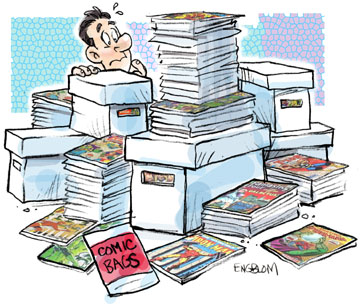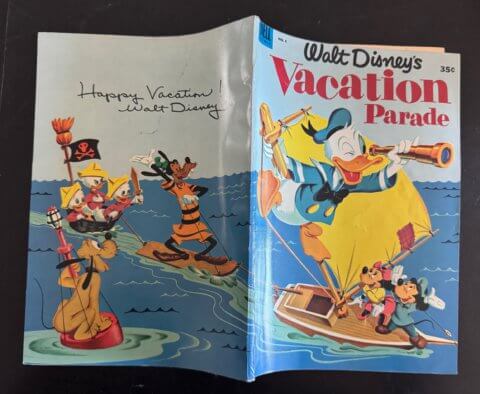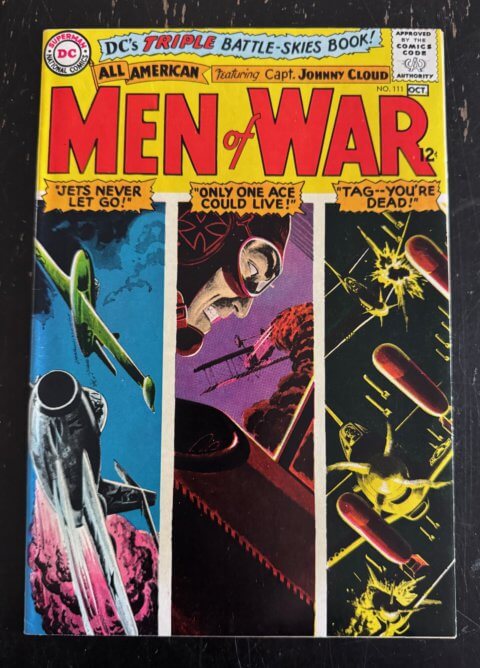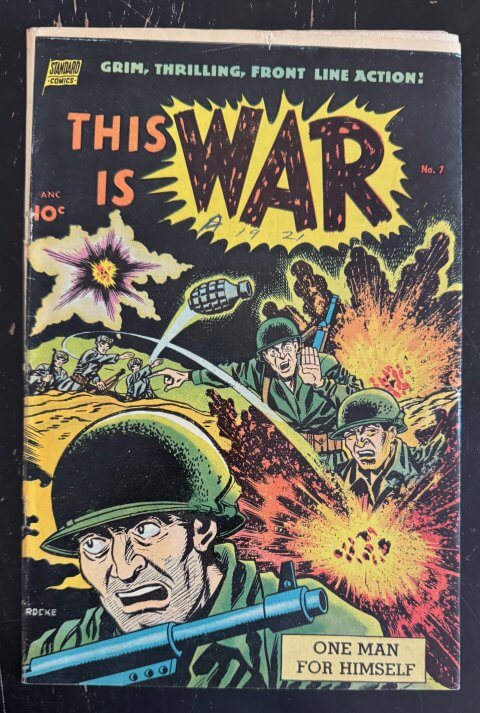
Time to Collect is a series of posts exploring collecting comics. We’ll focus on recognizing and exploring our collecting motivations and uncovering some common mistakes we seem to be prone to. The goal is a better understanding of how and why we collect and how we can be “better” at collecting, “better” both in terms of enjoying our collections and making “better” financial decisions while collecting. I’ve kept the parameters tight in this introduction but we’ll allow ourselves the right to deviate from them as we see fit.
I had a nice chat recently with my pal Chris Owen: Chris and I have recorded the Comic Culture podcast for the last 10 years and have talked a lot about comics. Recently we tackled the generic term “comic collecting”. What is comic collecting? I own a couple of comic book shops, Big B Comics in Hamilton, Ontario and Big B Comics in Niagara Falls, Ontario and I got to thinking how many of the people coming through the doors are comic book collectors? I initially blurted out “all of them” but quickly realized I was wrong. Comic collectors might actually be in the minority.
A comic book is a periodical, sequential art entertainment presented to the reader most often in a serialized form. Is a person consuming this entertainment a comic collector? A customer walks in and picks up Part 2 of the latest Batman story arc, she goes home and devours it with joy. If the utility of ownership has been satisfied with her reading the book, meaning if she felt what she paid justified the enjoyment she received from reading the comic and enjoying the art, then her relationship with the book has ended. She can toss it out, give it to her roommate, donate it to a school etc. She may have zero interest or motivation tin putting the book in a bag and board and then in a box and then find a dark, cool, dry place to store it. Are these comic book consumers collectors?
A comic book is also a collectible and our comic chops have a large clientele that comes in regularly looking for new issues that they can speculate on, and/or rare variant issues they can immediately flip online or through the various social media platforms. Are these speculators/flippers collectors?
We have a large back issue comic selection, especially in our Hamilton store and in both stores we have a great selection of bargain comics priced at $1.99 CAD or less. I know lots of guys that scour our bins looking for comics that recently appreciated in value as a collectible because of some movie announcement or some actor being cast. They also dig for our ‘mistakes’ – books of value put into the bargain bins. Are these customers digging in the bins and turning a quick profit collectors?
Defining comic book collecting it turns out isn’t that easy. I’m certain there are a percentage of our customers that are just consumers and I’m sure a smaller percentage are just investors and speculators that do not read what they buy but I’m also sure that there are many customers that collect what they buy.
A collector can be a consumer but not necessarily so. A collector can be an investor but not necessarily so, I know collectors who have donated their collections to University archives, local charities and even reading programs like Big B’s Comics for Grades program.
These Time to Collect posts will focus on the collectors and investors and not spend much time on the consumers. I see a collector as a default investor whose decision on what to do with the collection when it is “time to collect” as their choice and not relevant to this exercise.
I mentioned above my hope that these posts will help us to collect “better”. The first thing we need to do to become “better” collectors is to step back and figure out what type of collectors we are. What are our motivations, our goals? Why do you collect? For nostalgia? For a quick payday? For long term investment? For the thrill of the hunt? To read the stories? Are we hoarders that will never look at this stuff again? For other reasons? I’m sure there are other ways people collect that I have not mentioned above.
Over time our motivations and collecting patterns will most certainly change and that’s fine; it’s realizing that we will be changing that is helpful. So, as of right now, what kind of comic book collectors are we? I asked myself this question, and it turns out I’m a mix of many motivations so I’ll assume most of us are. I’m now trying to work out which motivations are the strongest, do I enjoy looking at my copy of Detective Comics #18 (connoisseur Walt), my copy of the Marvel Value Stamp booklet (nostalgia Walt), my collection of Romance Comics with wild, corny and sappy covers (fanboy Walt). I could go on but I won’t: it’s safe to say my collecting is driven by many motivations.
I did notice this about my collecting though: when I buy a nice copy of an Amazing Spider-Man book I look for the best deal possible because I’m buying it as a reseller/investor, I want to leave myself some room to make a bit of money. But, when I come across some Charlton Romance comics that I like price in relation to resale potential, it’s no longer the main decision driver: now it’s the condition, gloss, aesthetics. I’m always mindful of an eventual exit strategy though, as much as I’d like to I won’t buy a book if I sense that later I won’t be able to recoup even half my investment. When adding to my personal collection I’m still mindful of value but I’m more than happy to grab it if at least I can sense I can maybe get my money back down the road, maybe even take a little haircut. It turns out that to a good degree investment value is important to my collecting.
Writing the above paragraph has made me realize that I have not fully identified what kind of collector I am. I’m basically flying blind and I can tell you that I’ve made some purchases lately that I wish I did not…
Your homework this week is to try and figure out what kind of collector you are, identify your motivations, your goals, what brings you the most joy, what brings you the most stress etc. For motivation I’ll leave you with a quote from Lao Tzu – “He who knows others is wise; he who knows himself is enlightened.” – I’ll add – “… and has a damn fine comic collection!”




I agree it is difficult to define exactly what kind of collector I am! I collect runs, am motivated by cover art, and collect to a small degree as investment.
Recently I completed a run of Bobby Benson. I originally only picked up a few of this run because the were horror crossovers and having a few made me want the whole run! I realized that these books while not a super investment, still had great art and were affordable.
Most comics I try and obtain in the best condition I can afford which is easiest for newer. But the nostalgia in me will attempt at rarer comics in lower condition just so I can look on it and know I own it. They are still an investment albeit with a smaller return but there is still the pleasure factor in owning it! So I am all over the board as you are yourself!
You left out OCD Walt, who buys comics for the desire to own them regardless of if they’ll ever sell again because no one besides him would ever want them. That describes OCD Klaus, whose collection contains many oddballs that he paid way too much for but still loves anyway and doesn’t care they’ll ever sell. So, does OCD Walt exist on some plane or are you able to suppress the OCD aspect that I believe all collectors possess to some degree?
I think there is a problem with “collecting” in general. If you could see the room from which I write this you would accuse me of great hypocrisy, but I would beg to differ – most of what I have is intended to be functional (e.g. books and graphic novels that I _intend_ to read). There is of course the comic collection, but at this point I would grit my teeth and say 95% of it could go if the price were right, so I put that in the realm of investment. Only the remaining 5% is the “collection”, and just that small amount still gives me pause.
To me a “collection” in the sense we are discussing is a set of objects that the owner derives pleasure from purely from having them in their possession. In one sense this strikes me as an immoral pleasure if applied to any object with any function, because holding onto the object deprives others of its use. However, “use” is tricky. By enjoying ownership you could be in a sense “using” the object. Getting too philosophical maybe , but I think the gist of this is clear.
In the context of comic books I think a justification for collecting is generally that others wouldn’t take care of the object, and it would then be lost to posterity. So we are generally not depriving others of use, but rather preserving for the use of “deserving” posterity. Detective #18 is a perfect example of this – I am sure you are taking great care of this and it will last many more years into the future because of this. I can assure you that when you package it up and send it to me I will take similarly great care of it at my future undisclosed address.
I think the less nuanced collecting should be scrutinized from that perspective. With apologies to Gerald, I think run completists should question their motivations. Completing a run should be like fishing, and most sport fishing is catch and release – it’s more about testing and developing skill through the process than keeping around a bunch of dead trophies. So no need to keep the run as a “collection” once you have completed it (if the only purpose was to complete). The worst outcome of this unquestioned collecting is of course hoarding. In many cases this will actually go against the “preserve” motivation as the owner will not be able to take proper care of the collection.
That’s my stream of consciousness and I look forward to future posts.
Good first salvo gents,
Gerald, I think the lower grade more expensive books have been the best performing ones investment wise, it seems the “floor” has risen dramatically and the price of a low grade key issue has gone up dramatically.
Klaus! OCD Walt? I think I’ve avoided that curse/affliction/gift but I too have bought a few items that have me scratching my head mumbling “what the hell was I thinking”.
Chris you’ve introduced a great concept with your catch and release stance on runs. Someone told me the happiest day AND the saddest day is the day you find that last elusive book to finish off that run. I agree that a small percentage of my collection is actually my collection, the stuff I really care about, as for my Detective #18, that will have to be a local pick up.
I agree with Chris on his assessment of the run. With the mentioned Bobby Benson I have gotten pleasure both reading and displaying the straight western copies but certain runs I won’t complete because I have no interest in doing so. Example would be my Daredevil runs. I have 1-60 then I don’t pick it up again until just before the Miller run and again stop after Miller. so I am not completely a completest.
One last thing… they say if you have clothes in your closet you don’t wear, get rid of them. I thought of this sometime back with my comics. If I truly liked them I would want to see them so I display them, rotating every few weeks. One display holds 22 comics and I have two that display 6 each. I have come to realize I almost never display silver and bronze DC and so I have decided to start selling them off. I don’ actively collect them so I need to get rid of them and focus on what really interests me.
This is an interesting conversation to me. I think that collecting and reasons for collecting change over the years. When I was younger, my primary purpose for buying any comic was solely for reading. These were the days before bags and boards and such. Then as I grew older, my collection grew but also my awareness of what was “out there” grew as well. So as I became aware of older books, alternative books, underground comics, etc, my interests grew as well. Naturally you become attracted to certain artists and covers, but all the while still wanting to read books too. Like a lot of collectors, I have sold comics either out of necessity for money or for space and sometimes both. For the most part I have never lamented any books sold other than than for monetary reasons, thinking I sold “too soon” and that those books fetch a much higher price now. I used to be a completest, but have long since abandoned those days. No longer needing every appearance of a character or cover a favourite artist had done. I now buy some comics based on covers and some based on wanting to read them and the odd time, I buy an issue or two for investment purposes. With all these variant covers and such, a person would become very poor, very quickly trying to buy up every issue of every title. I think gone are the days of being able to buy “one of all Marvel and DC”, not that I was ever one of those, but having worked in comic shops, I know those collectors are out there. So I guess all in all, I still read, covet and invest in comics.
Good feedback continues to come in. Looks like we’re all a little of everything and it looks like we are more so than we were before.
Don’t forget incidental collections.
Years ago, when I was still actively buying the odd collection, or books found at yard sales, flea markets, etc; there would always be the odd Roy Rogers and/or Lone Ranger comic in the mix, two books I never collected.
Many years later, I now possess hundreds of these comics, with many duplicates, and I still don’t collect them. They just accumulated. Too bad these weren’t Whites ot something I did collect. Sigh.
I hear you Tony! A couple decades ago I was put comics on the back shelf as life was getting in the way. I still got the Comic Buyers Guide and started hearing about Valiant comics and they got me back into collecting! The problem I now have is a long box full of Valiants and they are hardly worth cover price…the fact is you can’t give them away! I still can’t stand the thought of starting my fire pit with them tho!
Walt, I like the header of comics. You’ve got a nice collection there. Spidey 1, Fury 1, Cap 100, DD 1, to name a few. It must be nice to own a comic store where you can buy nice stuff for a reasonable price and not be subject to auctions which go out of your reach fast.
I hear you too Tony, those books seemed like such a good decision at the time.
Klaus, That is an image unfortunately for me is one I grabbed off the net. Yes, there are some nice books there!!
I looked at those books in the header too! I own 17 of them including the dupes. Most I am betting in not as nice a condition.
I remember having a conversation with my younger sisters as to why they never collected comics even though they read the occasional one.
They said it had to do with the way women were depicted. In the early 40s and 50s, many were seen wearing shredded skimpy dresses and high heel shoes, and tied up, waiting for the big he-men to save them.
When women began appearing as superheroines, they too wore the skimpiest of costumes, readily available to be torn off in battle while their male counterpsrts wore more durable outfits.
Nowadays, most comics women are just about naked, as artists use them as eye candy. Many publishers will release swimsuit editions featuring the heroines basically wearing tissue paper bikinis.
Thinking about their comments, I’m glad they never happened across my collection of Warren”s 1984 magazines, what with their ‘vagina monologue’ panels, if you get my drift.
4.5